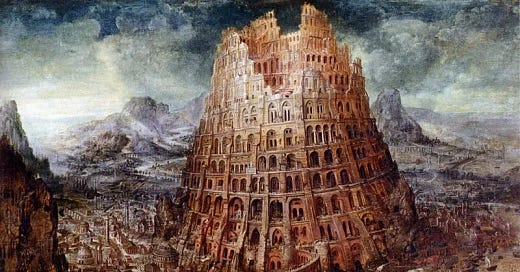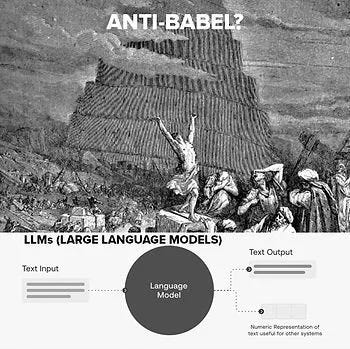The Tower of Babel and AI: Ancient Stories Echo in Modern Technology
Ancient Stories Echo in Modern Technology
The Tower of Babel story hit me differently when I started thinking about AI.
You probably know this ancient tale (from Christian (Genesis 11), Islamic, and Judaic traditions).
As the story goes, humans learned to speak one common language and developed brick technology (no more stacking odd-shaped rocks). They attempted to build a tower (a.k.a. Zigguraut) to the sky at a site about 60 miles south of modern-day Baghdad.
This disturbed the deity in charge, so he went down to check it out in person. This God did not like what he saw, so he "confused the languages" so that only some groups could understand others.
They were then forced to gather by common languages and go their separate ways with the people with whom they could communicate naturally. Hence, the "scattering of the nations."
This story took on new meaning when I heard Tristan Harris and Aza Raskin (two AI ethics leaders) discussing AI technology's rapid proliferation.
They described how all these separate silos of AI development are finally coming together in large language models, essentially "all speaking the same language." The realization hit me: This is anti-Babel. Based on a common language, things are coming together again — the LLM, Large Language Model. I am not passing judgment on this. I am just noticing it.
Language and power go deeper than just the Babel story. It is said that God created the universe by speaking. The creation of the cosmos was a speech event. The God of the descendants of Isaac (Judeo-Christianity) and the God of the descendants of Ishmael (Islam) is deeply invested in language.
Christians often call the Bible "The Word of God." And in the fourth gospel, this very curious passage opens the account. No one really knows what it means precisely: "In the beginning, the Word (LOGOS) was with God, and the LOGOS was God. Then the Word became a man and dwelt among us." Thus, the Judeo-Christian God emerges as a god who deals fundamentally in language.
A few takeaways:
The proliferation of AI technology, particularly large language models, creates an "anti-Babel" scenario. Where once languages were confused and people scattered, AI unifies technology under a shared language. As these disparate tech "languages" come together, are we really, as some posit, moving toward a kind of technological "singularity?"
Language plays a central role in understanding the divine across religious traditions. The act of God creating the universe through speech underscores this. That mysterious LOGOS concept—language itself being both divine and made flesh—suggests something profound about the power of words that we're just beginning to grasp.
The divine response to Babel wasn't "Don't do this!" It was "Spread out. Don't do this in one place." Does this speak to the concentration of AI capabilities in the West (Google, Microsoft, Amazon, Meta, IBM, and Apple) and China (Tencent, Biadu, SenseTime, etc.)?
If language holds this kind of sacred power—to create, unite, and divide—what responsibilities come with making artificial systems that can manipulate language with increasing sophistication?





